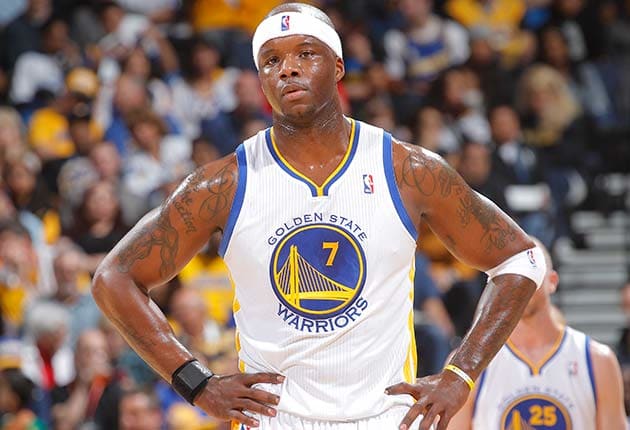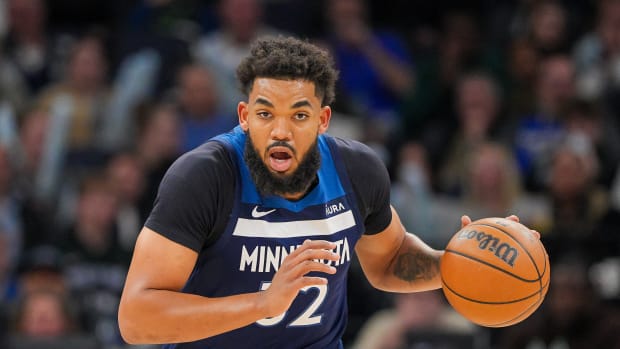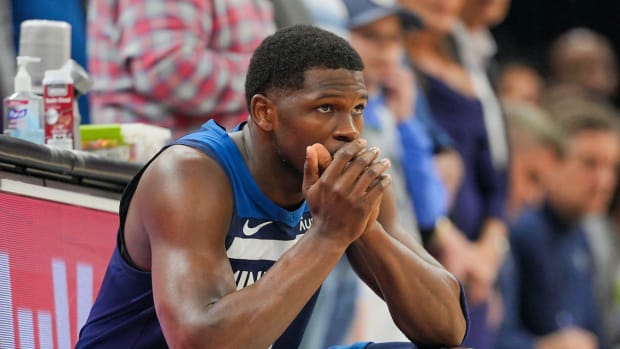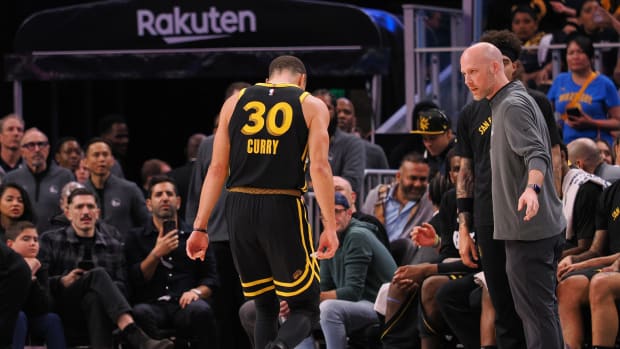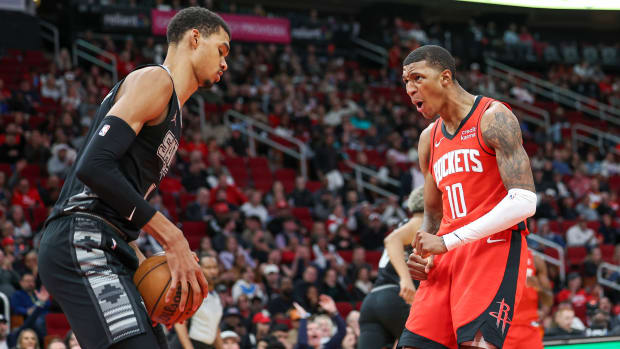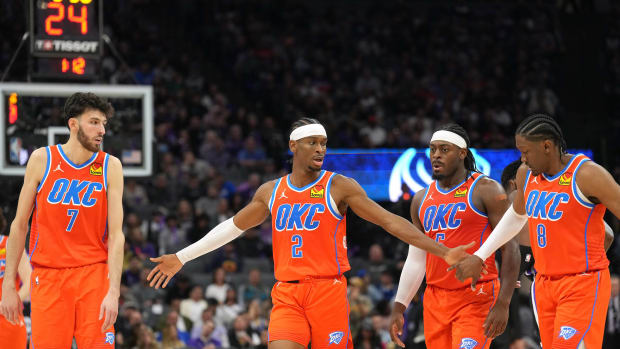Almost a champ: Jermaine O'Neal on leaving the Warriors
Last June, Jermaine O’Neal stood in his living room, watching what could have been.
On his flat screen, old teammates hopped and hugged and celebrated. After a 40-year drought, the Warriors were NBA champions. Out came Adam Silver, hoisting the Larry O’Brien Trophy.
Back at his house in Southlake, Texas, O’Neal watched, silent. His 15-year-old daughter, Asjia, stared at him. “Are you OK?” she asked, finally.
O’Neal didn’t answer.
*****
So often in sports we focus on the winners. But what about the almosts and might-have-beens? What about those who come this close and then, for whatever reason, miss out at the last moment?
When Jermaine O’Neal joined the Warriors in the fall of 2013 as a free agent, he was 35 years old and entering his 18th season in the NBA. Drafted out of high school by Portland in 1996, he’d spent his entire adult life in the league. He’d made six All-Star games, averaged a double double three years in a row, and earned north of $160 million. But the closest he ever got to a ring was the 2004 Eastern Conference finals, when the Pacers fell to the Pistons in six games.
• MORE NBA: Golden Season: Chronicling Warriors' pursuit of history
But in a young Warriors team, he saw promise. At the time, Golden State was coming off a 47-win season and an unlikely trip to the Western Conference semis. Draymond Green was still a little-used reserve. Harrison Barnes had recently turned 21. Steph Curry’s ankles remained a source of anxiety.
And yet, O’Neal was optimistic. “He was like, look, I think with a little bit of maturity this team can win a championship,” remembers Barnes. “That’s why he said he chose us.” Within weeks, “J.O.” became a mentor to the younger players, especially Barnes, Green and backup center Festus Ezeli. He told them stories about the old days—the era they grew up watching—and invited them to hang at his place. He took them bowling, talked about life and the business of the league. That season, the Warriors won 52 games before losing to the Clippers in Game 7 of the first round of the playoffs. Afterward, in the locker room, O’Neal noticed something unusual. “Sometimes in pro sports other things trump being cut deep emotionally when you lose, so you don’t see a lot of that at the pro level,” he says. “Usually it’s more in high school and college.” But there, across from him, were two teammates weeping: Steph Curry and Klay Thompson. This resonated. “When your two best players are affected by losing like that, I knew right away they were going to be good the next year.”
O’Neal found Warriors GM Bob Myers, his old agent. “I said, ‘Don’t do anything else. You don’t need anybody. These guys are going to be good.’” Later that summer, when O’Neal heard the rumors about Kevin Love, he called Myers. “I said, ‘Don’t you dare do that,’” remembers O’Neal. “Klay is one of the best two-way players in the game. He’s supremely underrated on defense. He moves his feet as well as anyone I’ve seen in a long time, and typically guys only go hard one way or the other, not both offense and defense. I said, ‘Bob, give these guys another year.’”
In the end, Myers did. O’Neal, however, did not. That summer, he chose not to return for a 19th season. His playing career, he said, was over.
*****
Still, as the 2014-5 season wore on, teams called. Veteran big men who can guard the rim and score in the post are a rare commodity, and the 6’11" O’Neal clearly had something left in his legs after averaging 7.9 points and 5.5 rebounds in limited minutes for Golden State. By February, reports had him joining the Mavs or Blazers for the stretch run or, possibly, returning to the Warriors.
Still, O’Neal was torn. For years, he’d told his family he was going to put them first. O’Neal didn't meet his father until his third season in the NBA, and then only briefly developed a relationship. Now, he was coaching his eight-year-old son’s basketball team. Asjia had recovered from open heart surgery and was a rising star in volleyball, a 6’3" middle blocker. He worried about the impact of leaving. “Physically, I could have done it. Mentally, no. My son and my family asked me not to, and that was the trump card. At the time, my son was saying, ‘Hey Dad, I need you.’ That did something to me. I was seeing changes in my son, he became more angry. And for a guy who didn’t meet his dad until seven years ago myself, I understood what it meant not to have a dad there.”
• MORE NBA: Ballard: How to shoot like Stephen Curry (or at least try...)
He stuck by his decision and now, watching from afar, he’s proud of his old team. He speaks about what he saw in a young Draymond—“His tenacity is what separates him”—while laughing when asked if Green ever guarded him in practice (“He used to get that work, tell him I said that!”). He remains impressed with Curry, who he says hasn’t changed. “You see a lot of people in sports who need to be humbled first to become who they are. That’s never really happened to Steph. Some guys come in and they’re super-humble and they get some success and then they change, everything changes. They become too big for other people. Not Steph. He’s still the same guy.”
These days the question O’Neal hears most from his son’s friends is, “Did you play with Steph?” Says O’Neal: “He’s like their modern-day Jordan.” He’s involved in a company with Lacob. He goes to his daughter’s volleyball games. He raves about the Warriors and the, “class of the organization.” Similarly, he’s annoyed by talk of Golden State not competing with teams of other eras. “The Warriors have an old-school work ethic,” he explains.
And yet, as happy as he says he is now, during that moment last June, standing in front of the TV, all he felt was empty. He’d done a lot of things in his career but never reached the Finals. And there were the guys—his guys, the ones he vacationed in Cabo with, who he bowled with and had late-night talks with—celebrating. So when his daughter asked that question—"Are you OK?"—he couldn’t answer. She stood there for a moment, then disappeared upstairs.
• MORE NBA: NBA sleepers, prospects to watch in NCAA tournament
A few minutes later, O’Neal’s phone buzzed. She’d sent a text. In it, she wrote about how she was so happy that he was home and how much it meant to her that that he traveled and watched her play volleyball and was there for her brother and that, “Dad you being home is like you being a champion.” “It made me so emotional,” O’Neal says. “When she wrote the text, how much it meant to her, to get that, it cleared up everything. All the emotions I had, missing out on the championship. That did it and I knew right away that my time was over.”
His teammates say they understand. Barnes, who remains close with O’Neal, says, “I think he can have some peace in the fact that he knows he was part of our development. He was part of the reason we won.” He pauses. “There are things bigger than the game.”
As for O’Neal, he watches these Warriors cruising toward history, one win at a time. He sees Steph setting records, and a dynasty in the making. He’s sure he could have played two more years, especially after receiving platelet-rich plasma therapy on his knees in Germany. Hell, he hasn’t even officially filed his retirement papers. But he says he’s OK with how it all turned out. Last year, his father passed away. He says it reinforced what mattered. “Sometimes you can’t be a champion. That doesn’t determine who you are,” he says. “But you can be a champion father, and that means everything. That means everything.”






























